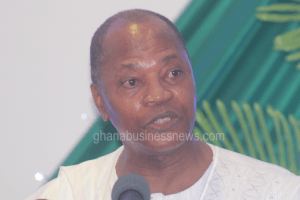Public support for unconstitutional regime changes creates serious dilemmas – Chambas

Dr Mohamed Ibn Chambas, Ghanaian international diplomat, says public support for coup d’état creates serious dilemmas, complicating the enforcement of regional norms relating to democracy and good governance.
Dr Chambas, former Special Representative of the United Nations Secretary-General and Head of the United Nations Office for West Africa and the Sahel (UNOWAS), said recent cases of coup d’état, as in Mali and Guinea, were particularly troubling as they had tended to win the support of many Malian and Guinean citizens.
He said more proactive interventions that prevented constitutional crises and obviates the need for sanctions, was a critical way out of such dilemmas, adding that “this, in turn, demands more proactive engagement, facilitated through dialogue and mediation.”
Dr Chambas said this in his virtual keynote address at “A Regional Workshop on Building Infrastructures for Peace in West Africa” in Freetown, Sierre Leone.
The workshop is being by organised by the Kofi Annan International Peacekeeping Training Centre (KAIPTC) with the generous support of the Government of Denmark and in partnership with the National Early Warning and Response Mechanism Coordinating Centre, and the West Africa Network for Peacebuilding (WANEP) in Sierra Leone.
It brought together participants from Ghana, The Gambia, Sierra Leone, the Ivory Coast and Senegal.
“Just at a time when many thought coup d’état – as a means of gaining access to the political centre – had become a thing of the past in West Africa, military adventurism in politics and unconstitutional regime changes seem to be creeping back into the political arena of some states in the sub region,” Dr Chambas stated.
He said the resurgence of military interventions sent very bad signals with serious potential for democratic reversals across the region.
“Although the sources of insecurity in West Africa are diverse and multiple, it is the activities of extremist movements that are generating the most devastating outcomes,” he said
“Currently, many countries in the Sahel region are experiencing an increase in violent extremist activities, particularly in the Liptako-Gourma region, which borders Burkina Faso, Mali and Niger.”
He said territories already threatened by violent extremism had seen an intensification in deadly attacks in recent times carried out mainly by the al-Qaeda-linked Nusrat al-Islam wal-Muslimin (JNIM), Islamic State in the Greater Sahel (ISGS) and Islamic State West Africa Province (ISWP) while Boko Haram continued its attacks in Northeast Nigeria and the Lake Chad Basin area.
He noted that the threat of violent extremism was ultimately embedded in structural violence and the crisis of state capacity weakness.
Dr Chambas said in some instances, extremist groups had emerged in response to and influenced by varied and multiple domestic contexts and issues often embedded in state-society relations.
He said the absence of state presence in many “ungoverned” spaces, marginalization and discrimination against peripheral communities, failure to provide basic socio-economic infrastructure such as education, health and water created a fertile ground for radicalisation.
He said that prompted the immediate question of how to facilitate effective processes of dialogue with actors whose modus operandi was increasingly shrinking the space for negotiation and mediation.
Major General Francis Ofori, Commandant, KAIPTC, said the Centre would continue to support efforts towards building sustainable peace on the African continent through pragmatic research, and capacity building programmes.
Dr Emmanuel Gaima, Governance Adviser, Government of Sierra Leone, said his country was now among countries that had established an infrastructure for peace.
Mr Tom Nørring, Danish Ambassador to Ghana, said the workshop offered a platform for sharing experiences and ideas in the field of conflict prevention and peacebuilding.
Dr Onyinye Onwuka, Head of Mediation and Coordination of Regional Political Affairs, ECOWAS Commission, said the increasing spate of election-related disputes and violence, inter-communal conflicts, the recent blight of terrorism in the ECOWAS region and the resurgence of coup d’états had more than ever before reaffirmed the need to rethink their response mechanisms and systems, as they strove to promote peace and strengthen social, communal and national cohesion across the region.
Source: GNA
